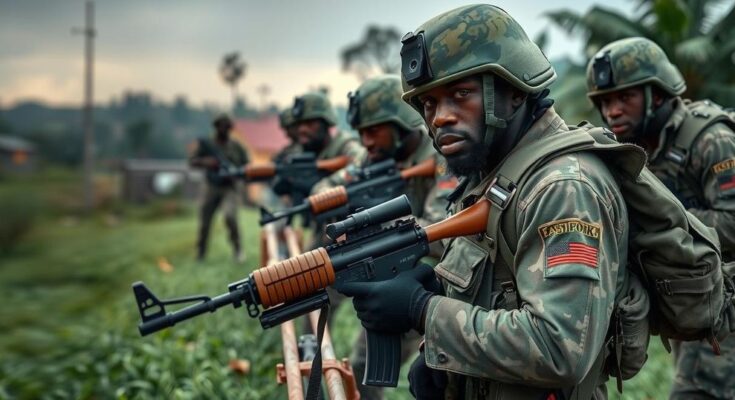In December 2024, over 290,000 people fled the Lubero region in North Kivu due to escalating conflicts between the Congolese army and the M23 rebel group, with total displacements in the province reaching 2.7 million. The humanitarian situation worsens with ongoing attacks from the ADF and struggles over strategic locations like Masisi. The conflict reflects deeper systemic issues affecting the safety and well-being of civilians in the region.
In December 2024, the humanitarian crisis in the Lubero region of North Kivu, Democratic Republic of Congo (DR Congo), escalated as more than 290,000 individuals were compelled to flee due to violent clashes between the Congolese army and the M23 rebel group. This surge of displaced individuals adds to the existing toll of approximately 2.7 million people already uprooted from their homes within the province, as reported by the United Nations Office for the Coordination of Humanitarian Affairs (OCHA). The conflict has been fueled by violent insurgencies from multiple armed groups, including the M23, which has received external support from Rwanda, and the ADF (Allied Democratic Forces), a Ugandan rebel group that has sworn allegiance to the Islamic State and has been active for several years in the region.
The fighting intensified amid the failure of peace negotiations held in Luanda, Angola, in mid-December. This instability has particularly affected the town of Masisi, which has changed hands multiple times between the M23 and government forces, leading to ongoing instability and uncertainty for its residents. The regular army, alongside pro-government militias, is engaged in efforts to regain control over strategic hills surrounding Masisi, which the M23 maintains for launching further assaults. Notably, the surrounding city of Goma has faced encirclement by M23 forces, heightening security concerns in the region.
The situation in North Kivu reflects a broader crisis in the DRC, where armed conflict has historically undermined local communities and exacerbated vulnerabilities, impacting basic human rights, including access to education and safety. The backdrop of such ongoing violence complicates sustainable solutions for peace and recovery in the region.
The ongoing conflict in North Kivu has deep historical roots, involving multiple armed factions and regional geopolitical interests. The M23 rebel group, active since its emergence in 2012, is reputed to receive military support from Rwanda, which significantly enhances its capacity to engage in territorial battles against the Congolese army. Conversely, the ADF has been implicated in horrific abuses against civilians, contributing to the grave humanitarian situation. The UN reports emphasize the dire conditions of displaced populations and reflect the urgent need for resolution and support in the face of relentless violence. Understanding this context is essential to grasp the severity of the current crisis and the factors prolonging the conflict.
The humanitarian crisis in North Kivu highlights the severe impact of armed conflict on civilian populations, leading to widespread displacement and suffering. The battles between the M23 rebel group and Congolese forces, compounded by external support from Rwanda, exacerbate the already fragile situation. The inability to establish and maintain peace, evidenced by recent failures in negotiations, underscores the complexity of finding solutions to restore stability and address the urgent needs of millions affected by violence in the Democratic Republic of Congo.
Original Source: www.fides.org




